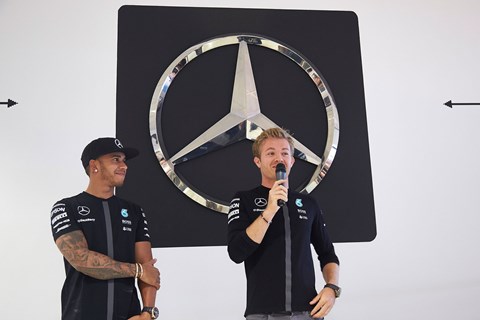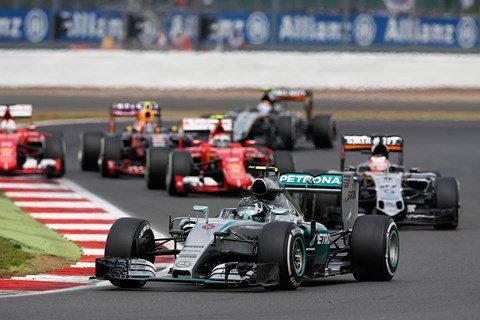► Ben Oliver blogs on the British GP
► Who’ll be next to challenge Mercedes?
► The hard path to F1 dominance
At yesterday’s British Grand Prix, I asked a driver for a team other than Mercedes how it feels to be mostly racing for third place: honestly, off-the-record, and free of the usual PR spin. ‘It sucks,’ he said.
The other car makers must find Mercedes’ current dominance equally disheartening. Audi has long been expected to enter F1 and hand its dominance in endurance racing to stablemate Porsche. It hired former Ferrari F1 chief Stefano Domenicali to ‘work in the areas of service and mobility’ (yeah, right) and the recent (official) departure of VW group chairman Ferdinand Piech, who hated Bernie Ecclestone, was expected to remove the only barrier to an Audi entry.
Yet Audi boss Rupert Stadler’s recent comments have been noticeably cool on F1, and the British Grand Prix just proved why. It was the sixth 1-2 for Mercedes in the nine rounds of the season so far; the team has won all but one race. A works F1 team from a mainstream car maker has never been so dominant: Renault’s two world championships as a constructor in 2005 and 2006 came with incredibly tight margins.
The risks of entering F1
The risk to a rival premium car maker of entering F1 as an engine supplier and getting drubbed by Mercedes in every race is probably now too great. None of the current teams could close the gap to Mercedes over the winter, and Audi will be looking at McLaren-Honda’s form with a mixture of horror and relief. If you were going to back one car maker to get a (re-) entry to F1 right first time, it would have been Honda. But it’s not until you go to a race (this was my first of the season) and witness that car run that you realize how slow, flatulent and broken-sounding it is. If the other drivers are disheartened at racing for third, imagine Button and Alonso’s despair at not making it out of Q1.
The only sure way to be competitive is to get the (British-built) Mercedes engine, leading to some particularly wild rumours. We had the chance to ask Mercedes team principal Toto Wolff about the latest one, originating in a rival magazine: that Red Bull would ditch its Renault engines for Aston Martin-badged Mercedes units, because Mercedes wants to better leverage its investment in its F1 engines, and has a 5% stake in Aston, which will use turbocharged Mercedes V8 engines in its road cars.

‘There are definitely no plans to do this,’ said the Austrian before the race, with a deliberate slowness that said ‘don’t be bloody stupid’. ‘You might question the logic of us giving our engines to our biggest rivals, although maybe we have to recalibrate who our biggest rivals are.’
This last comment proved particularly prescient. Having been runner-up to Mercedes last season, Red Bull now lies fourth. In the race it was Mercedes-powered Williams that most scared Mr Wolff; Massa and Bottas getting the jump on Hamilton and Rosberg before normal service was resumed.
Win on Sunday, sell on Monday
But while Audi (and BMW) must be glad they’re not getting punished by Mercedes the way Honda, Renault and Ferrari are, they must also be ruing the fact that the threee-pointed star is everywhere every second Sunday, and that Lewis and Nico talk – genuinely – about how much they love their Mercedes. Win on Sunday, personal contract plan on Monday. In the latest UK new car sales figures, Mercedes is up 17 per cent for the first six months of the year, in a market that’s up 7 per cent. BMW’s growth matched the market; Audi only grew by 2.6 per cent. Audi and BMW still have more market share, but Mercedes’ growth means it sold as many cars here in the first six months of 2015 as it did in the whole of 2010. Is that all down to the dominance of the Silver Arrows? No. Does it help enough to really annoy Audi? Unquestionably.
